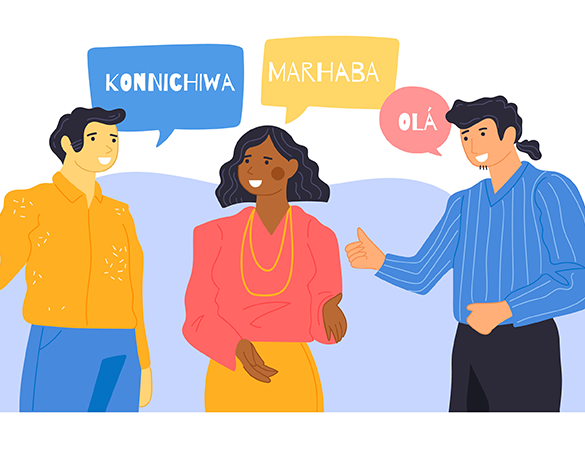Rosetta Translation offers a range of interpreting services to meet the needs of our clients. Whether you need a conference interpreted simultaneously or consecutive interpreting services for a business meeting, we have the right interpreter in our team for your needs.

In consecutive interpreting services, the interpreter stands beside the speaker and interprets in sections, i.e. consecutively. Whilst the speaker is talking, depending on the length of the sections of speech, the interpreter may take notes, and then when the speaker stops, the interpreter respeaks what has been said into the target language. The interpreter will reproduce what has been said accurately and faithfully.
For consecutive interpreting, our experienced, qualified interpreters work both into and out of their mother tongue.
As consecutive interpreting generally only needs one or sometimes two interpreters, and no specialist equipment say, as would be needed for simultaneous interpreting (see our simultaneous interpreting page for more information on how that works), consecutive interpreting is widely used in more intimate settings, such as business meetings, business to client (B2C) meetings and informal settings, such as at hospital appointments and individuals meeting with council officials. Consecutive interpreting can also be used in larger settings, such as on-stage interviews at conventions or speeches, where the person speaking is allowed to convey a few sentences, or even a whole thought process, in their native language and the interpreter speaks after they have finished to the audience, translating it into their language so they may understand. The interpreter may need to translate the interviewer’s questions to the interviewee too, meaning they work in and out of the source and target languages respectively. In such public settings this works quite well and as such is generally what is used the most. Consecutive interpreting is also best used when there is a single language pair needed, such as Japanese into English and vice versa. If you are looking to have more than one language pair at your meeting or event, it is best to consider Simultaneous Interpreting.

In reality, for a meeting that needs a consecutive interpreter, you can expect costs to generally be lower as there is minimal equipment needed, and often just one interpreter needed. Simultaneous interpreting generally requires the additional use of specialist equipment, such as high-quality microphones, headsets and speakers. Simultaneous interpreting is also extremely mentally taxing, so the longer a meeting or event goes on, you may need to have more than one simultaneous interpreter per language pair to ensure it stays crisp and accurate. At Rosetta Translation, we can provide quotes for all simultaneous interpreters you may need, as well as any specialist equipment needed for your event or meeting.
Interpreting from one language into another, and vice versa, is an incredible skill that takes years of learning and experience to hone and perfect. Interpreting involves not just language skills in the appropriate language pair, but the ability to listen, understand and clearly convey meaning in a very short period of time. Many translators, that is, those who only translate the written word, may not necessarily have the skills to be an interpreter (those who translate the spoken word). Translators have the pleasure of more time when it comes to finding the perfect phrase or word in the target language, often being able to consult many different materials, such as official dictionaries, glossaries and style guides, however interpreters have to work without these, so their knowledge on vocabulary, grammar and style must be readily available in their head at all times.
Therefore, when you book consecutive interpreting services with Rosetta Translation, we may request some details of the meeting beforehand, just so they can make sure they are ready for the associated vocabulary and concepts. For example, the kind of language used during a business meeting between two companies involved in mining would be very different to the language that would be used, say, during a meeting at Doctor’s office. There’s no point knowing about specific EU policy wording for steel production and import when you’ve got coughs and colds on the brain instead!
Additionally, many consecutive interpreters would be happy to work without a pen and paper, especially if the meeting is quite informal and they can clarify the exact meaning meant by those speaking before they interpret, however in more formal meetings, you can expect them to listen to the speaker, make careful, systematic notes, and then speak. This does mean that the speaker will have to pause in order for the interpreter to speak. Be mindful that the interpreter may take a brief moment to make sure they are communicating the source language effectively, especially when it is between two languages where they have differing sentence order and structure as this may need to be reshuffled.
We also offer simultaneous, whispered simultaneous, telephone and liaison interpreting.






What is the UN French Language Day? On 20 March, we once again celebrate UN French Language Day, a global celebration of linguistic diversity and cultural exchange. Created by the United Nations in 2010, this day is to remind us …


© 2025 All Rights Reserved